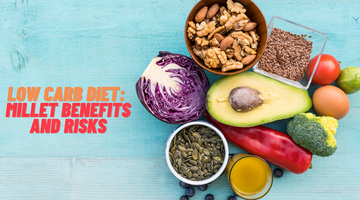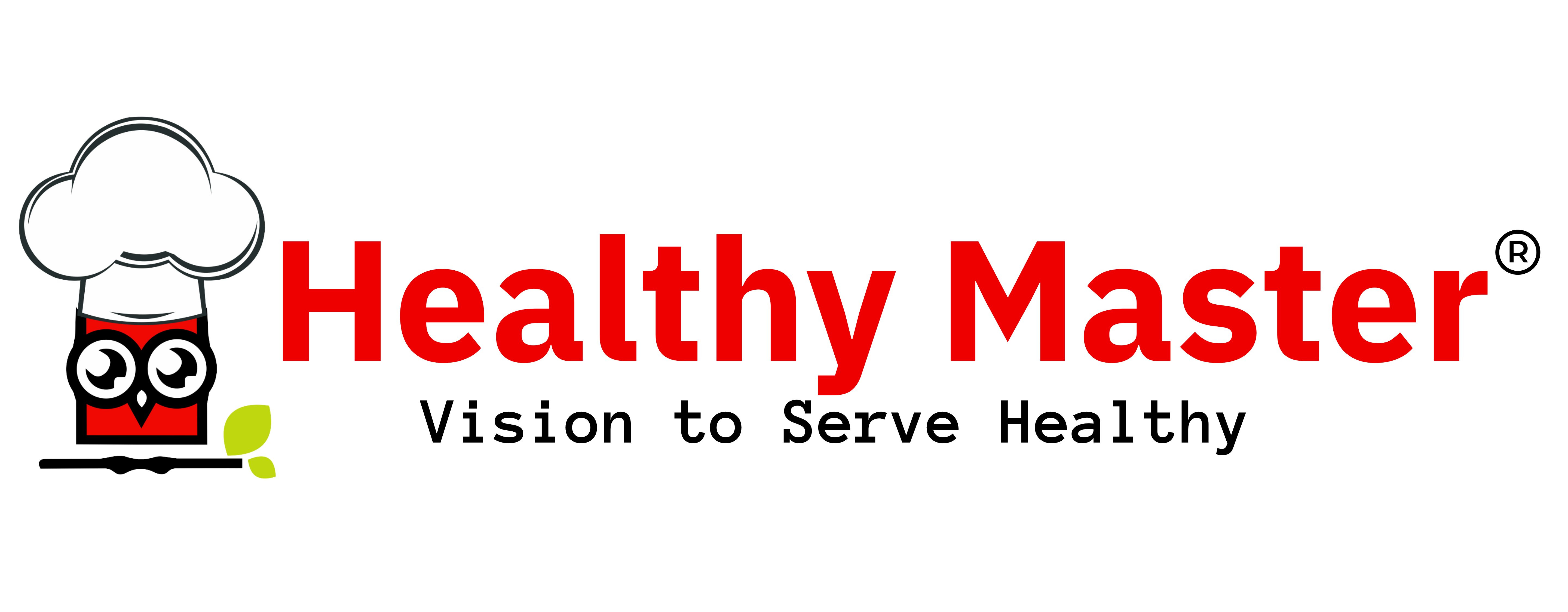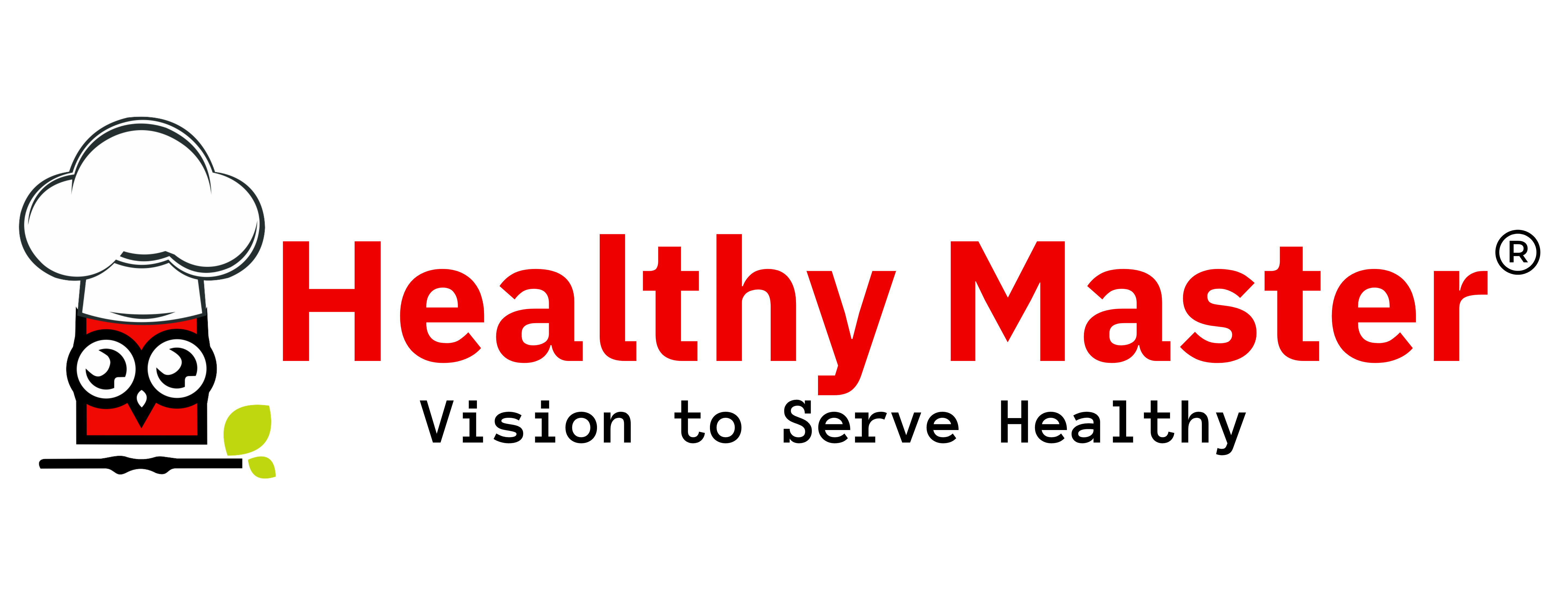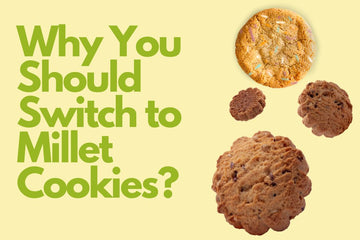
Low Carb Diet: Millet Benefits And Risks
Millets have become incredibly popular in recent years because of their remarkable nutritional profile and numerous health advantages. Nutritious and gluten-free, millets are a great way to add some extra health benefits to your regular diet. But it's important to realise that no food is good for everyone all the time.
It might not be a good idea for some people to consume millet due to health issues. They could have negative reactions or side effects, particularly if they eat a large portion of millet.
In this blog, we shall look at the top millet benefits and risks and how you can use them in a low-carb diet. Low-carbohydrate meals focus on limiting the carb intake in the body when compared to a regular meal. Foods rich in carbohydrates are restricted in this type of diet and substituted with diet foods rich in fat and protein. A low-carb diet should be capable of burning fat for energy. This results in quick weight loss.
The Role of Millet in Low Carb Diet:
Millet is one of the best options for a low-carb diet. It is full of dietary fiber, and has very low amounts of carbohydrate counts. Millet also has low glycemic index, and as a result it takes more time to digest than what flour. Therefore, it is considered as a great option for people following a diabetic friendly diet. However, it is very important to choose the right quality millets for your diet.
Here you will find some basic information on different types of millets available in the market today. This will help you to make an informed decision and choose the right option for your diet needs.
What Varieties Of Millet Are Available?

Few people are aware that there are different kinds of millet. We shall now look at the different types of millets listed below.
- Jawar
- Bajra
- Ragi
- Foxtail millets
- Quinoa
- Barnyard millets
- Little millets
- Kodo millets
1. Enhances Digestive Well-Being

Millets are abundant in both soluble and insoluble dietary fibre. Being a prebiotic, the insoluble fibre helps the beneficial bacteria in your digestive system. Additionally, the fibre gives your poop more volume, which promotes regularity and lowers your risk of colon cancer.
2.Protects Your Heart Health

Soluble fibre, found in millets, traps fat in the digestive tract and lowers blood cholesterol. That may lessen your risk of developing heart disease, or atherosclerosis. Magnesium is also abundant in millets and may help prevent heart failure.
3. Regulates Blood Sugar

Due to their low glycemic index (GI), millets can prevent blood sugar spikes after meals. Millets are a good whole grain, especially if you have type 2 diabetes, because they contain non-starchy polysaccharides, fibre, and indigestible carbohydrates that help control your blood sugar.
4. Prevents Celiac Disease
The illness called celiac disease harms the small intestine and prevents food from being absorbed properly. This illness prevents some people from consuming gluten. Since millet is entirely gluten-free, you can begin incorporating it into your diet.
5. Boost Immunity

Soluble fibre from millets creates a viscous material in the stomach that traps fats and lowers cholesterol. Research demonstrates that millet consumption lowers triglyceride levels.
Additionally, millet protein has the potential to raise HDL (good) cholesterol and adiponectin levels while also lowering cholesterol. The hormone adiponectin promotes heart health, prevents inflammation, and increases the oxidation of fatty acids.
6. Lowers Levels Of Bad Cholesterol

Soluble fibre from millets creates a viscous material in the stomach that traps fats and lowers cholesterol. Research demonstrates that millet consumption lowers triglyceride levels.
Additionally, millet protein has the potential to raise HDL (good) cholesterol and adiponectin levels while also lowering cholesterol. The hormone adiponectin promotes heart health, prevents inflammation, and increases the oxidation of fatty acids.
Side Effects Of Consuming Millets
1. Goitrogens In Millet

Substances known as goitrogens suppress thyroid function and can cause goitre. Moreover, thyroid is caused by goitrogens in millets, which inhibit iodine absorption.
Research has indicated that people whose main source of nutrition is millets may develop kidney stones or thyroid problems. Therefore, you must include other grains in your daily diet as well in order to prevent such situations.
2. Deficiency Of Iodine

Iodine deficiency can result from regularly eating large amounts of millets. Your body and your health are not being served by following this method. Iodine deficiency causes serious health problems such as kidney stones, thyroid, anxiety, and enlarged glands.
3. Millet Diet

It is not a good idea to replace your entire diet with millet. This grain is not your perfect substitute for wheat or rice. Furthermore, while whole wheat is an exception, you should never rely solely on one type of grain. Depending on your health, you should always include a variety of grains in your diet to ensure that it is balanced.
4. Blockages

Because millets are high in fibre, eating too much of them can cause bloating, swelling, and obstruction in the stomach. blocking the systems in your body as a result. As such, it is essential to consume the appropriate amount.
Tips To Keep In Mind

- Gradually include millets into your diet, but do not get carried away by making it your entire diet plan.
- Find out how to cook millets properly. When millets are cooked incorrectly, it can lead to a number of common challenges.
- Millets that have been soaked or sprouted improve nutrient absorption and prevent digestive problems.
- Water is essential for healthy digestion of your millets.
- To avoid digestive problems, do not combine two or more types of millets at once.
Takeaway
Millets are good for your health, but like any grain, not everyone will benefit from them, so it's important to monitor how much you eat and make sure millets are a part of your balanced diet.
Always remember to get advice from your doctor or nutritionist before making any major dietary changes. Visit Healthy Master for a wide range of healthy snack products.










